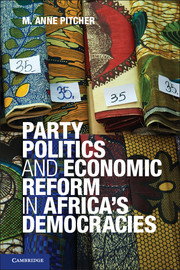Book contents
- Frontmatter
- Contents
- Tables, Figures, and Maps
- Acknowledgments
- Abbreviations
- Map
- 1 Understanding Institutional Development in Africa
- 2 From Motivational to Imperative Commitment
- 3 The Impact of Party Politics and Democratic Quality on Economic Reform
- 4 Party Fragmentation and Ad Hoc Private Sector Development in a Limited Democracy
- 5 Stable Parties, Limited Democracy, and Partisan Private Sector Development
- 6 Stable Parties, Liberal Democracy, and Strategic Compromise
- 7 Conclusion
- Appendix 1 Coding Scheme
- Appendix 2 Coding Scheme Indicators of Imperative Commitments
- Appendix 3 Effective Number of Parliamentary Parties (ENPP) in Nine African Democracies c. 1990s–2000s
- Bibliography
- Index
- References
4 - Party Fragmentation and Ad Hoc Private Sector Development in a Limited Democracy
Zambia
Published online by Cambridge University Press: 05 June 2012
- Frontmatter
- Contents
- Tables, Figures, and Maps
- Acknowledgments
- Abbreviations
- Map
- 1 Understanding Institutional Development in Africa
- 2 From Motivational to Imperative Commitment
- 3 The Impact of Party Politics and Democratic Quality on Economic Reform
- 4 Party Fragmentation and Ad Hoc Private Sector Development in a Limited Democracy
- 5 Stable Parties, Limited Democracy, and Partisan Private Sector Development
- 6 Stable Parties, Liberal Democracy, and Strategic Compromise
- 7 Conclusion
- Appendix 1 Coding Scheme
- Appendix 2 Coding Scheme Indicators of Imperative Commitments
- Appendix 3 Effective Number of Parliamentary Parties (ENPP) in Nine African Democracies c. 1990s–2000s
- Bibliography
- Index
- References
Summary
Introduction
By the early 1990s, conditions in Zambia appeared highly favorable to the implementation of economic reforms. Previous efforts by the one-party state to address structural imbalances in the economy had failed. Copper production, Zambia’s greatest asset, had stagnated; by the late 1980s, even that sector’s powerful trade union was calling for private sector investment to revitalize the mining industry. Declining formal sector employment amidst rising prices for basic staples such as mealie-meal, left a majority of households struggling to meet their daily needs. Furthermore, by 1991, voters of Zambia had channeled their discontent into support for a new party, the Movement for Multiparty Democracy. The MMD was elected by a landslide when the country returned to multiparty elections after a hiatus of two decades. Notably, the election manifesto of the party pledged to adopt privatization once it assumed office. Donors responded to the new government’s plans to transform the economy by increasing aid.
Nearly fifteen years later, however, the implementation of institutional arrangements designed to foster a private sector–driven economy had brought mixed results. On the one hand, the Zambian government made a high motivational commitment to expand its private sector and the extent of this commitment was associated with the extent to which Zambia approximated a commitment that was credible in the imperative sense by 2005. The government sold firms, liberalized trade, passed legislation favorable to business, and reformed the banking sector. On the other hand, owing to opportunistic actions by the ruling party, that commitment failed to be fully credible. Zambia’s imperative commitment score of 24.5 is the median score of those countries analyzed in Chapter 2. Such results do not reflect well on a program that observers once labeled “one of the most successful in sub-Saharan Africa.”
- Type
- Chapter
- Information
- Party Politics and Economic Reform in Africa's Democracies , pp. 105 - 144Publisher: Cambridge University PressPrint publication year: 2012

